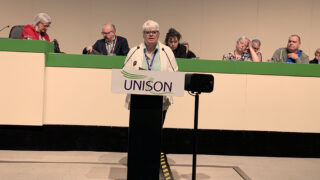UNISON’s women’s conference meets in Bournemouth tomorrow, where a packed agenda awaits.
With the UK having just started its first full year under a Boris Johnson government, one of the dominant themes at conference will be continuing austerity – because, aside from the announcement of a rise in the national minimum wage to come in the spring, election campaign promises to end austerity have yet to be realised.
Conference will be debating a wide range of austerity-related issues, from the growing crisis in social care – with its effect on the largely female care workforce and on women who are expected to be carers in the family – to the impact on women of welfare cuts and changes to benefits.
A substantial motion from the national women’s committee calls for better funding for social care services, including better pay and service conditions for the predominantly female social care workforce.

Observing that gaps in the social care sector are frequently filled by unpaid and informal carers – again, largely women – an amendment from the northern region points out that “the lack of children and young people’s provisions like Sure Start compounds this problem.”
On welfare and benefits, a motion from the national women’s committee points out that, since “women head up 90% of one-parent families and are most likely to be in lower-paid jobs, where universal credit is required to supplement income,” the two-child benefit cap “has a disproportionate impact on women.”
Women and leave
There are a raft of motions addressing issues around women and leave. One raises the issue of how, if a woman gives birth prematurely or to a baby with complex medical needs, she is still only entitled to the same amount of maternity leave as if the pregnancy went to term or the baby was born with no significant health problems.
The motion, from Scotland region, calls for a campaign for additional paid leave in such circumstances – and for the union to collect examples of best practice on how employers can support women in such circumstances.
In another motion, EDF Energy (Doxford) raises the issue of women needing to take unpaid leave to care for dependants.
Menopause and harassment

The menopause features on the agenda in a number of motions, ranging from the general health implications for all women to raising awareness of the issue, from welcoming UNISON’s guidance on menopause and the workplace to the particular difficulties facing Black menopausal women.
Read more about the menopause – and access UNISON resources – www.unison.org.uk/menopause
Delegates will also be discussing Brexit, the NHS (and Brexit and the NHS) and domestic abuse.
On sexual harassment, the national committee has brought together a major motion highlighting the ongoing problem of such harassment in the workplace.
It notes that the union has also launched the #UsToo campaign, to make workplaces harassment free zones. The campaign emphasises “the inadequacy of the current laws and asks for a change.”
And UNISON will be launching new guidance on sexual harassment in the workplace during conference.
It’s set to be a busy few days.
Find out more about women in UNISON at www.unison.org.uk/women






